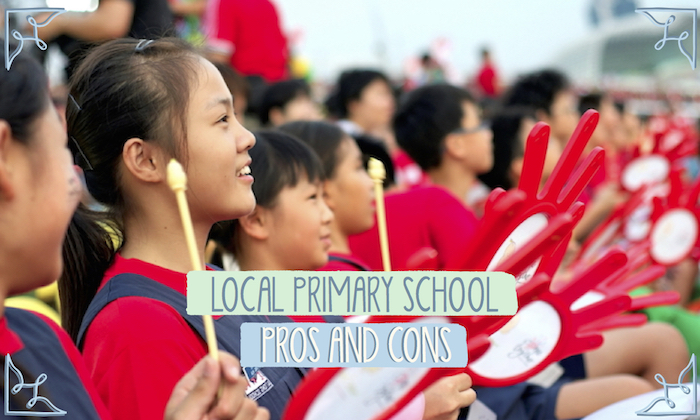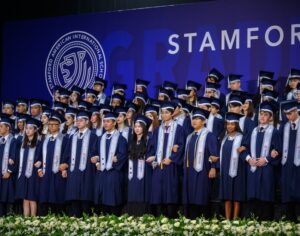
Considering sending your child to local primary school? Here’s what one mama has learned over the course of her first challenging year
Throughout the course of the past year, American mama (and former elementary school teacher) Crystal has documented her family’s experience sending her daughter to local primary school, first in discussing why they chose to send her to local school rather than an international school, followed by the stressful navigation of the P1 registration process, initial bouts of culture shock, and a reflection on the experience half-way through. After a full year, Crystal is in a very different place than where she started out. If you’re considering sending your child to local schools, or are just curious to hear whether or not Crystal’s decided to stick it out, you’ll definitely want to read on for her take, mama!
Disclaimer—My family’s experience is an individual one, and should not be taken as representative of the entire system.
We survived Primary One.
No matter how long you’ve lived in Singapore, if you are a foreigner, Primary One will be an adjustment of monumental proportions. The past 11 months have involved tears, hours of drilling spelling words in two languages, and endless questions about American versus British grammar. There were moments when I thought that we were crazy to embark on this journey and looked at Singapore’s American School websites with longing for the familiar.
There are a number of things I wish I had known before the start of the school year, including—
The rules here are often bewilderingly picky.
My physical therapist recounted that when her older daughter was in P6, you had to use the word “lungs” to have your answer marked right, but when her son recently took the same test the correct answer was “air sacs.” A doctor was gobsmacked to learn that the liver and pancreas are not part of the digestive system in P4—“Not until P6,” she was told. Elanor had several instances where a sentence with correct grammar was marked wrong, and her teacher refused to discuss why.
We’re not the only ones—on October 7, 2015, there was an article in the Straits Times—“Primary 1 pupil’s English composition answer generates online debate”—that highlighted an issue about which I have commiserated with other parents. The student wrote the following sentence, “If I were to plan a birthday, I would plan it for my mother. Instead of a cake I would make cupcakes.” The teacher marked it wrong, changing it to “If I am to plan a birthday, I will plan it for my mother. Instead of getting a cake, I will make cupcakes.” There has been a great amount of debate about who was right.
From what local teacher friends have told me, there are very strict rules about what constitutes a “right answer” for each grade level, and many teachers don’t feel empowered to be flexible. This can often be a source of great frustration for expat and local parents alike.
Parents have limited opportunities to be part of the school
On September 22, 2015, the MOE issued a press release. One of the goals in particular caught my eye said, “To deepen parent partnership, MOE has developed a range of resources to support the ongoing professional development of our teachers in better engaging parents to support their child’s education journey. These include guidelines, tips and planning resources that schools can adapt to better engage and communicate with parents to build successful and effective school-home partnerships.”
There are many areas where I feel that the local schools are a better fit for our values as parents, However, I’ve been frustrated by our school’s lack of communication and interaction between our school and the home, and a dearth of opportunities to get involved.
I knew schools in Singapore would differ from their American counterparts—there wouldn’t be as much of an emphasis on fundraising as school funding is centralized here, for one—but I was unprepared for how unwelcome I would feel. There is a Parent Support Group, but after a brief introduction to them at Primary One orientation, there was never any further communication. I expected to get heads up about meetings and further invitations to join/volunteer. But there were none. If you want to join, you’ll have to be proactive as I now know to be next year.
The structure of the schools in Singapore—with a different teacher for every subject with multiple classes, as opposed to one teacher for all the subjects—makes it more difficult to create volunteer opportunities in the classroom. A friend in Florida, USA, helps the teacher in her daughter’s Primary Two class give the spelling test, as half of the words each week are specific to the individual child. Parents in her school are also regularly invited in to read with their children and to the whole class during literacy time. While that might not work with the existing curriculum, our co-form teacher left on maternity leave too late in the year to secure a long-term sub. Parent volunteers could have been mobilized to support the form teacher (who was also our math teacher) had we been asked to do so.
Between joining the PSG and the new MOE directive to improve home/school communication, I hope to have more opportunities to be a part of the school community next year.
I would be lying if I didn’t say that I have ended the year more ambivalent than I felt a year ago. In part, I blame my own experiences as a primary school teacher—it turns out that I feel more passionate about things like monthly letters from the teacher and bright, colorful bulletin boards than I thought I did. At the same time, I am so grateful for opportunities given in local schools that she wouldn’t have in the US—the math curriculum is superior to what I taught, and I never imagined that my daughter would be a confident Mandarin speaker at the age of seven.
Just like our experience as first time expats, I believe that the first year is always the hardest. After that, things will become incrementally easier and we assimilate. While I confess to the occasional glance at international school websites, Elanor is happy and successful at her current school. So I take a deep breath and close my browser.
Bring it on, Primary Two—let’s do this thing.






 View All
View All




 View All
View All









 View All
View All




